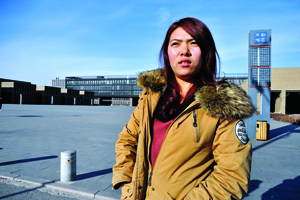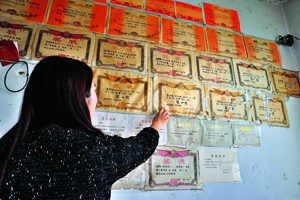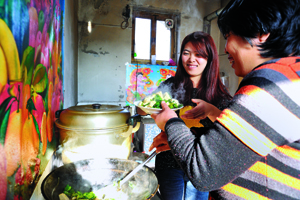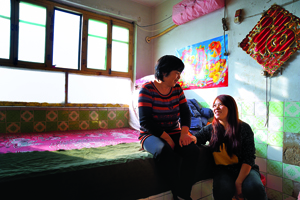

| Family Love | ||||||||
| By Li Wei-huang Translated by Tang Yau-yang Photos by Huang Xiao-zhe | ||||||||
In Tianjin, one of the most developed cities in China, a college student keeps her expenses under 500 renminbi (80 American dollars) a month. Though strapped for cash, she feels rich at heart because she has the love and support of her family.
Tianjin is a major city in China, located 120 kilometers (75 miles) southeast of Beijing, a mere 30 minutes away via the high-speed rail. The city boasts more than 50 colleges. Lu Yixin (呂伊芯) is a sophomore at one of those colleges, the Tianjin University of Technology. Yixin’s family lives in Ninghe, about a two-hour drive from downtown Tianjin. Her mother survived a severe illness in 2011, but the episode left the family deep in debt. Given that history, it’s no wonder that Yixin keeps her expenses between 300 and 500 renminbi (US$50-80) a month, spending only about US$2 a day for her meals. “I never join my classmates for entertainment. A 50-renminbi (US$8) film ticket can feed me for three to four days,” Yixin said, referring to the admission charge at the cinema on campus. Because of the cost, she’s never seen a movie there. Yixin’s lifestyle probably would not be ideal for most college students, but she seems to take it in stride, even though some occasional emotional disturbances are inevitable. She knows how to control herself and ignore others’ opinions about her frugality. Her attitude towards this has become even stronger since she learned about Tzu Chi. She knows that comparing yourself to others and competing with them only brings suffering. She believes that even though she is materially poor, she is rich at heart. Perhaps that is why there is always a hint of a smile on her face when she talks.
Medicine first Despite her young age, Yixin has already been through much in life. In the summer of 2011, before her senior year in high school, her mother, Lu Yanjuan (呂豔鵑), came down with a horrendous headache. The village doctor measured her systolic blood pressure (the higher of the two numbers) at 220, so they rushed her to a hospital in town for a CT scan. That was followed by a trip to the county hospital an hour away, and finally to a city hospital in Tianjin for emergency surgery. It turned out that a tumor in Yanjuan’s brain had ruptured. The event all but killed her. At that time, only eight days before the school year was to start , Yixin told her mother that she would not go back to school. “If you don’t go back to school, I’ll jump off the eighth floor,” her mother said in tears. She had only finished elementary school herself, and she would do anything—sell all they owned or rush around to borrow money—to put her girl through school. “Only education can help you get ahead,” she told her. Yanjuan stayed at the hospital for 21 days before being discharged. Besides the huge hospital bills that piled up during that time, she now faced an ongoing monthly expenditure of more than a thousand renminbi (US$160) for medication. After paying these large medical expenses, the family had no money left to send Yixin and her younger brother, Lu Yiming (呂伊明), to school. Their father, Lu Shaohong (呂紹洪), did odd jobs and sometimes tended their field, but his income was neither high nor stable. As a result, the two children would have to go to school without paying tuition, or at least not on time. Yixin, normally lively and sunny, became taciturn and quiet. Helpless and not knowing what to do, she turned to her homeroom teacher, Liu Yong (劉永). She told him about her family’s situation and asked for a partial waiver on her tuition and fees. To Liu, Yixin was a mature girl with good grades. He could not just let her quit school; he wanted to help. He sought and got approval from the principal for a partial waiver of her school fees. At around that time, Tzu Chi volunteers from Tianjin visited the school for the first time, seeking candidates from needy families for tuition aid. The school submitted a list that included Yixin. In December 2011, just before her last high school winter break, Yixin received 2,000 renminbi (US$320) from Tzu Chi. She used part of that money to buy medicine for her mother, who had been worried about the substantial debt that the family had run up borrowing from relatives and friends to pay for her medicine. “Such timely help when we’re badly in need—we’ll never forget the kindness!” the mother said of the aid. After sitting for her National Higher Education Entrance Examination, Yixin took a job at a shoe factory near home. Earning just 45 renminbi (US$7) a day, she made 4,000 renminbi (US$645) in three months. She planned to apply that money toward her college tuition, but her mother needed another operation at the time. The surgery set the family back more than 10,000 renminbi (US$1,600). That really demoralized Yixin. “I worked my heart out all summer, and for all that, I only got this much, not enough for anything,” she muttered, the hard-earned money in hand. The tuition, dorm room, books, and other expenses for her freshman year amounted to 7,000 renminbi (US$1,130). Though her mother’s low-income status entitled Yixin to a reduction of 2,000 renminbi, her family could not pay what still amounted to a huge sum for them. She had to defer paying until the end of the academic year, when Tzu Chi provided her with additional monetary aid. Yixin barely squeaked by that first year, but there would be three more years of the same heavy burden and anxiety. She felt pressure and guilt for putting such a load on her family. “Sometimes, I really hoped to find money on the ground while walking,” she said. Yixin and her brother got jobs for the summer before she started her sophomore year. Unfortunately, she was stricken by facial nerve paralysis only a couple of weeks into the job. She was forced to rest at home for a month. Her medical bills ate away every cent of the thousand renminbi or so that she had made on that job, and more. After that, she often told her brother, “Let’s just pinch pennies. That’s about as good as making money for Mom and Dad.”
Good influences Though pressed for money, Yixin participates in Tzu Chi activities as often as her schoolwork allows. When she earned the privilege of wearing a Tzu Chi volunteer uniform, she called her mother to share her excitement. At first, Yixin thought that Tzu Chi was just a charity that gave out money. She did not expect to receive so much care and warmth from its volunteers. “Let us know if you come across any difficulties,” they told her when they first met. They joined hands and sang the Tzu Chi song “One Family” together. “I felt right then that we really were family,” Yixin remarked. Volunteers have since given her warmth and made a big difference in her life. She vowed to become one who gives others help. “Tzu Chi has transformed me,” she said. She practices what she has learned, including “Never delay in fulfilling filial piety.” Though she goes home only once every three weeks, she calls her parents every two or three days to chat with them. Yixin recalled her teenage years, when she didn’t even talk very much with her father, let alone tell him her secrets or worries. But after she noticed that Tzu Chi volunteers achieved wonderful effects by being gentle, she learned how to get along better with her father, who is usually quick-tempered and loud. She is all smiles when she cajoles and soothes her dad. She has also shown even more care to her mother and brother. When the weather turns cold, Yixin says to her mother, “Bundle up, it’s cold outside,” or “Don’t go out in the snow so much. It’s quite slippery.” In response to her daughter’s tender loving care, Yanjuan always says, “Okay, okay,” a bit shyly but apparently with joy in her heart. Yixin remembered the first Chinese New Year after her mother’s brain tumor episode. It was a tough time for the family, but her father said optimistically, “Forget about how much money we have left. Hey, at least we’re all well and together.” Yixin completely agreed with him on that. She could not imagine what it would have been like if the illness had taken her mother away from them. “I cherish very dearly the time that I have with my mother. I take her hand in mine every time we go out,” she said. “Having gotten her back from the brink has helped me realize more deeply that we should really cherish what we have. Don’t wait till it’s too late and be sorry.” One day before going back to school at the end of a holiday, she mustered some courage and said to her mother, “Mom, let me give you a kiss.” “What for? You’re no longer a baby,” her mother said shyly. [Chinese people are traditionally very reserved in expressing their feelings.] Cheek to cheek, Yixin felt the roughness and inelasticity of her mother’s skin on her own smooth face. Sadly, she suddenly realized that her parents had gotten on in years. Her mother has often told Yixin to find time to join Tzu Chi volunteers in their activities. She has noticed that her daughter has become more mature, considerate, and sweet since she became involved with the work of the foundation. “She does the household chores every time she’s home,” she marveled. “She won’t let me do any work.” Yixin confessed that she used to dream of moving far away from home, but now she takes advantage of every opportunity to get close to her family. The National Higher Education Entrance Examina-tion required participants to list their preferred schools to attend, and Yixin listed only colleges in Tianjin for their proximity to home. Fortunately, she was accepted into one of them. She feels at peace near her parents, and she believes they feel the same way.
Beautiful wall decorations Yixin was the student president of her class through junior and senior high schools, and she earned very good grades during all those years. A wall at home is adorned with many certificates of achievement, some hers, others her brother’s. “Those are the most beautiful wall decorations,” their mother said happily and proudly. Yixin will be a junior in the fall. She cannot wait to graduate so she can begin working and making money. She wants to help put her brother through college and relieve him from having to worry about expenses like her. Her father is now a public bus driver and brings in a more steady income than before. Her mother is still on medication and sees the doctor regularly, but her condition is more stable than before. Though still in debt, the whole family is together and their hearts are close to each other. Reflecting on these facts, Yixin thinks that these are the best days that her family has ever had. She is thankful for the way things are going. She recalled the time after her mom fell ill, and her heart brimmed with gratitude when she thought of the financial aid from Tzu Chi. She was thankful for the assistance that reached her just when she really needed help. “It was like timely rain.” One thing she loves to do now is embrace Tzu Chi volunteers. “The hugs always feel so warm. I want to be like the volunteers and be a seed of love, too. I want to spread love to other people.” Her love and care just might be a timely rain that falls on someone in need. |
















|




